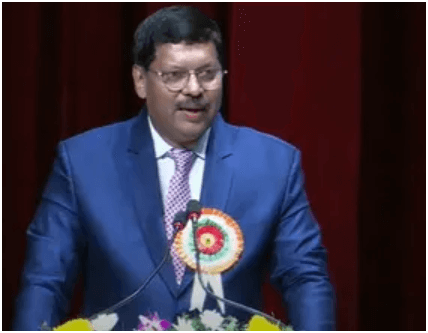Justice Bhushan Ramkrishna Gavai was sworn in as the 52nd Chief Justice of India in a solemn ceremony that marked a new chapter in the country’s judicial leadership.
Bhushan Ramkrishna Gavai succeeds Justice Sanjiv Khanna, assuming the highest judicial office in the world’s largest democracy. The oath of office was administered by the President of India at the Rashtrapati Bhavan, attended by senior government officials, members of the judiciary, and distinguished legal professionals.
Justice Gavai’s elevation to the top post is seen as a moment of historic significance. Hailing from Maharashtra, he is one of the few Chief Justices of India to come from the Scheduled Caste community, a representation that holds deep symbolic and constitutional importance. His rise through the ranks of the judiciary has been widely regarded as a testament to his legal acumen, commitment to justice, and dedication to upholding the rule of law.
Born in 1961, Justice Gavai pursued law from Government Law College, Mumbai, and began his legal career in the Bombay High Court. He was appointed a judge of the Bombay High Court in 2003 and served there with distinction for over a decade and a half before being elevated to the Supreme Court in 2019. Over the years, he has authored numerous landmark judgments and has been involved in a wide array of constitutional, civil, and criminal cases, earning the respect of both his peers and the legal fraternity.
Justice Gavai’s judicial philosophy has been characterized by a balance between progressive values and constitutional discipline. He has shown a particular sensitivity to issues concerning social justice, civil liberties, and administrative fairness. Legal experts note that his judgments often reflect a grounded understanding of the socio-economic challenges faced by ordinary citizens, while still adhering closely to the text and spirit of the Constitution.
As Chief Justice, Justice Gavai assumes office at a time when the judiciary is navigating complex challenges—including pendency of cases, judicial infrastructure modernization, the integration of technology in courtrooms, and the constant task of maintaining judicial independence. His leadership is expected to focus on enhancing the efficiency of the justice delivery system while also addressing systemic reforms aimed at reducing delays and making legal processes more accessible to the public.
Among his immediate responsibilities will be overseeing judicial appointments, strengthening legal outreach to marginalized communities, and fostering transparency in the functioning of courts. Observers believe that his tenure may also emphasize institutional accountability, greater digitization, and a renewed push toward alternative dispute resolution mechanisms to reduce the burden on the courts.
The appointment of Gavai has been widely welcomed across legal and political circles. Members of the Bar Council, senior advocates, and civil society groups have expressed optimism about his leadership, describing it as a step forward for inclusivity and justice in India. His deep understanding of constitutional law and social context is expected to guide the judiciary through critical decisions in the coming months.
Justice Gavai takes charge at a pivotal time for India, with key legal matters on the horizon involving electoral reforms, privacy and data protection, environmental regulation, and federal-state relations. His approach to these issues will likely shape public confidence in the judiciary and impact the direction of constitutional governance in the country.
As he begins his term, Gavai stands as a symbol of meritocracy and resilience within the Indian legal system. His tenure as Chief of India will not only influence landmark judicial verdicts but also serve as a beacon for equity, integrity, and inclusive growth within the country’s legal framework.Justice B.R. Gavai’s tenure is anticipated to leave a significant impact on both the judicial landscape and the broader democratic fabric of India.
As someone who has experienced the justice system from multiple perspectives—starting from the grassroots level in the Bombay High Court to the apex of the Supreme Court—his insights are expected to translate into pragmatic leadership. Legal scholars suggest that he will prioritize reinforcing the foundational principles of the Constitution, such as secularism, equality before the law, and the protection of fundamental rights.
Stay informed with the latest updates – click here .

